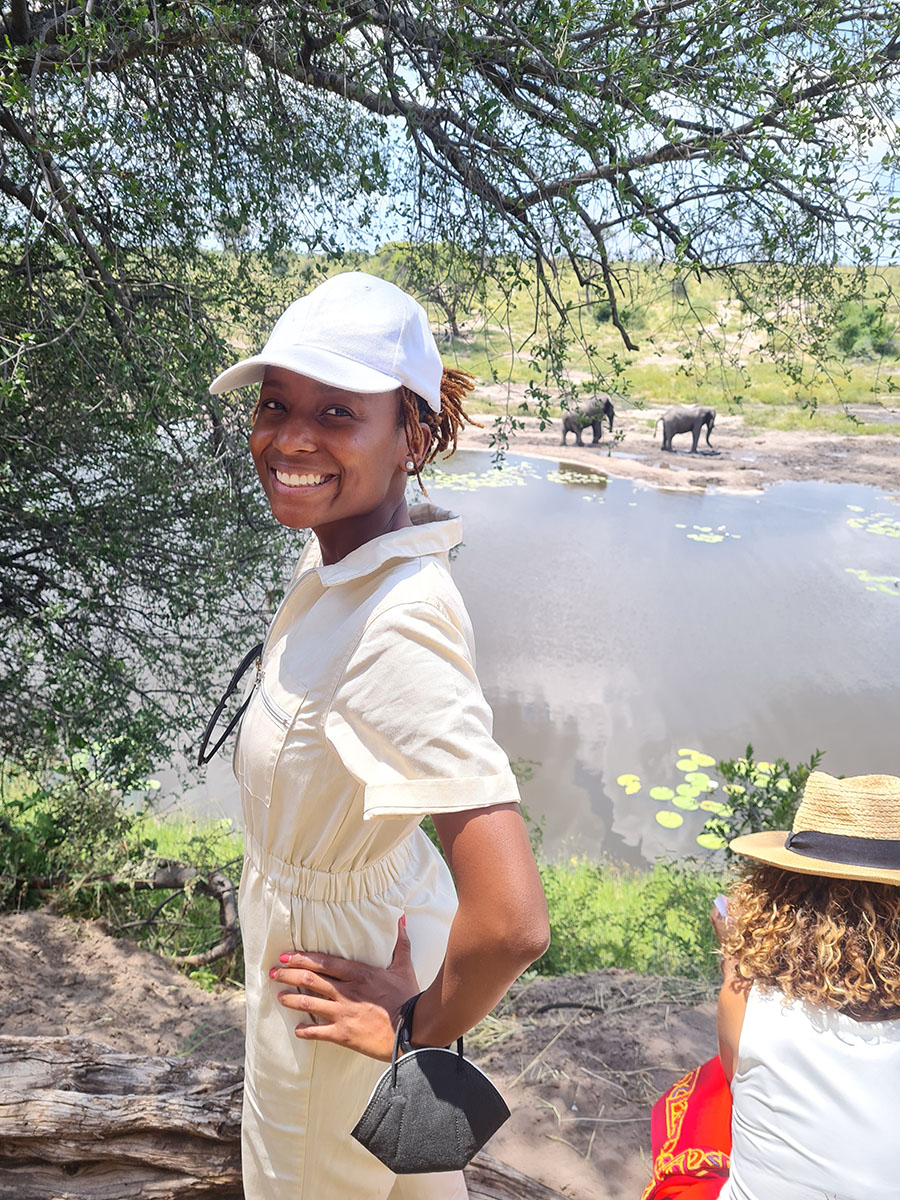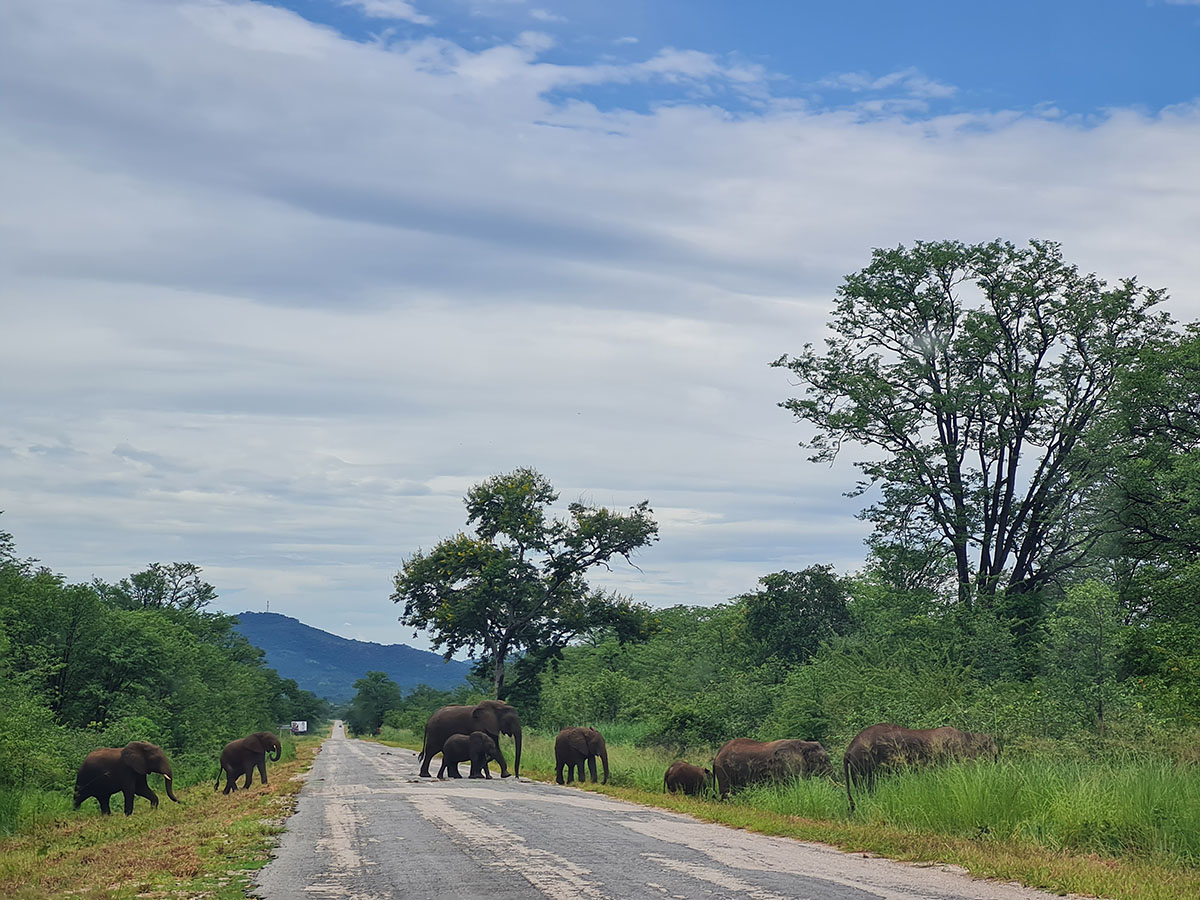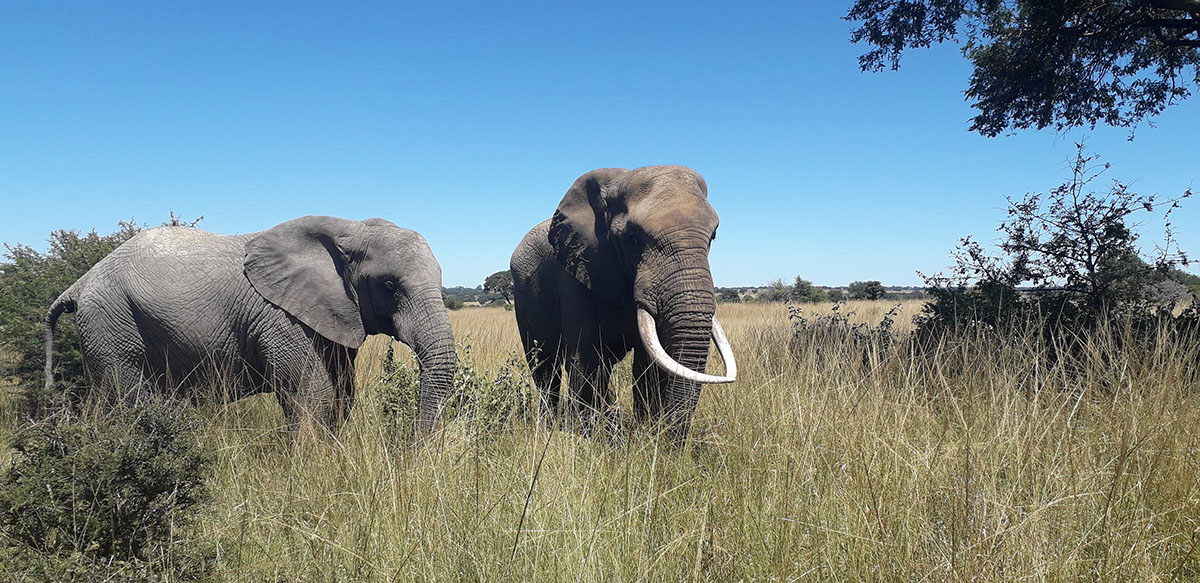
Photo courtesy Taku Mutezo

Photo courtesy Taku Mutezo
“Whooooop!” The sound of an elephant. A trumpet greeting — or warning — urging us to take action against poaching and human-wildlife conflict. Hambai Wild, a social enterprise founded by Taku Mutezo, intends to do just that.
Mutezo is a wildlife lawyer, farmer, and Mandela Washington Fellow from the teapot-shaped landlocked country in Southern Africa known as Zimbabwe. This country is not only Mutezo’s home, but host to a quarter of the world’s elephant population.

As a child, Mutezo spent most of her summer holidays in a small rural village known as Nyanyadzi in the town of Chimanimani. While there, she nursed a love of nature, community, and agriculture, as she spent most of her leisure time in the fields with friends or in the wild. When Mutezo’s father got a job for a coal mining company, her family had to relocate — and their new home just so happened to be situated around one of the oldest national parks in Zimbabwe, Hwange National Park — also known as Zim Park. While at the park, she learned that every 15 minutes, an elephant is killed in the wild. This explains why only about 400,000 elephants are left in Africa today, as opposed to the 10 million wild elephants that roamed the continent in the 1930s, according to the World Wildlife Fund.
Despite this, Zimbabwe has one of the largest elephant populations in the world, with a population of more than 100,000 elephants. Although a testament to effective conservation efforts, this poses several challenges, as the current population exceeds Zim Park’s stated ideal capacity of 40,000 elephants. While elephants are near extinction in other parts of the world, Zimbabwe is struggling to devise strategies to cope with overpopulation, yet the threats remain the same: human-wildlife conflict and poaching.
Human-wildlife conflict is a big issue in Zimbabwe, where most wildlife are found in protected areas adjacent to rural, communal lands. And not only is the elephant population increasing, the human population shares the same growth curve. The country increasingly sees food security threatened by elephants that encroach into human spaces, destroying crops and killing humans. Mutezo believes this problem can be solved, which is the reason for her choice of educational path.

“After completing high school at Peterhouse Girls School in Zimbabwe, I left my home and family to study environmental law at The University of Groningen in the Netherlands, one of the most prestigious law schools in Europe,” Mutezo says. “It was a platform for exposure to various fields of law including my area of specialization — Wildlife Law.”
During her studies, Mutezo had the opportunity to work at the Wildlife Justice Commission (WJC), which greatly shaped her perspective of the wildlife industry.
“It was during my work at WJC that I gained a better understanding and appreciation of the fact that wildlife crime is one of the most lucrative, illegal businesses in the world and considered a multi-billion-dollar industry,” Mutezo says.
With the mass exodus of African youth to Europe and America in search of better opportunities, one would expect Mutezo to stay in the Netherlands for “greener pastures.” Instead, she packed her bags and returned to Zimbabwe.
“Motivated by my combined love for people and nature, and equipped with the knowledge gained from my studies and work in the Netherlands, I decided to return to Zimbabwe,” Mutezo says. “It struck me deeply that it took leaving my home to appreciate the impact that wildlife crimes, such as poaching, have on Zimbabwe — and the entire globe. My goal was and remains to find home-grown solutions to local and global issues such as wildlife crime. I would like the future generations to enjoy wildlife, too.”
It has been over 5 years since Mutezo moved back to Zimbabwe, and she has dedicated her law degree to wildlife conservation by working with the Tikki Hywood Foundation.
“I am the first lawyer employed by a Conservation Organization in Zimbabwe,” she says. “My work in case management includes legal advisory on various wildlife crime cases, including cross-border and high-profile matters, and has set precedence as to how wildlife crime cases should be handled across the region. My contribution also extends to drafting and amending key legislation including laws that ensure that endangered species such as rhinoceros, pangolin, and painted dogs are recognized and given the highest protection at law.”
By developing partnerships with various national authorities, she co-authored a handbook on prosecuting wildlife crimes and educated law enforcement and judicial officers across Zimbabwe on wildlife and the law.
“It has been a great honor to innovate and find ways to use the law as a tool to conserve and protect wildlife,” Mutezo says.
Having participated in the 2022 cohort of the U.S. State Department’s flagship leadership program for young African leaders, the Mandela Washington Fellowship (MWF), at the University of Nebraska-Lincoln, Mutezo feels she has an even tighter grip on her vision to solve the human-wildlife conflict in her country. (In full disclosure, MWF is where this author met Mutezo.)
She returns with a wealth of knowledge and access to resources to effectively execute her focus project at Hambai Wild, a registered agri-business she founded, with the goal of finding solutions to the human-wildlife conflict, by creating natural boundaries between humans and wildlife.
“My solution to this problem is to use one endangered species to protect another, by encouraging beekeeping to scare elephants,” she says. Bees, as well as chili pepper, act as natural repellents against elephants.
“MWF allowed me to turn an idea into an action plan,” Mutezo says. “The access to a coach also gave me an opportunity to fine tune the idea into a viable business model that I intend to bring to fruition back in Zimbabwe. I also pitched my project to different people from whom I got constructive feedback to transition from inception to execution.”
She intends to use her prowess as a farmer and knowledge as a wildlife lawyer and policy expert to engage communities affected by wildlife conflicts.
To be more practical, she says, “Hambai Wild will use the contract farming model, by providing inputs to local communities such as seedlings, beekeeping kits, and by empowering the local population with technical expertise and training to grow chili peppers and keep bees. This would allow us the option of buying back the produce and selling sustainably sourced produce.”

Just like in a colony where each bee plays a contributing role to the survival of the hive, she looks forward to strategic partnerships with other organizations that have successfully implemented similar models, like Save The Elephants in Kenya and AWF (African Wildlife Foundation) in Uganda.
Says Mutezo: “I encourage collective action by everyone to protect the Zim’s natural resources for future generations.”